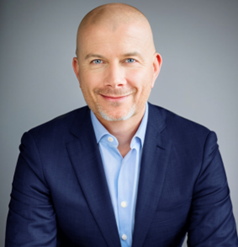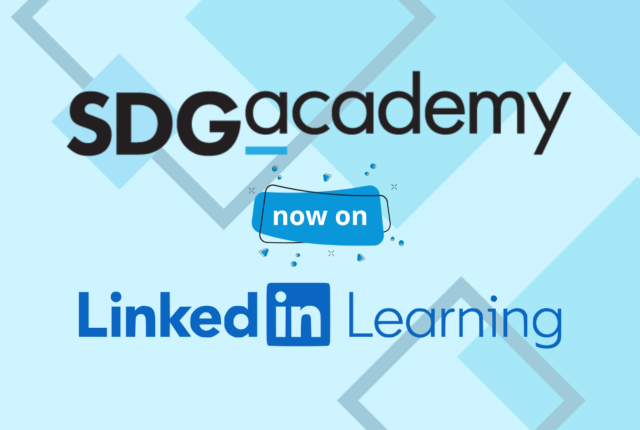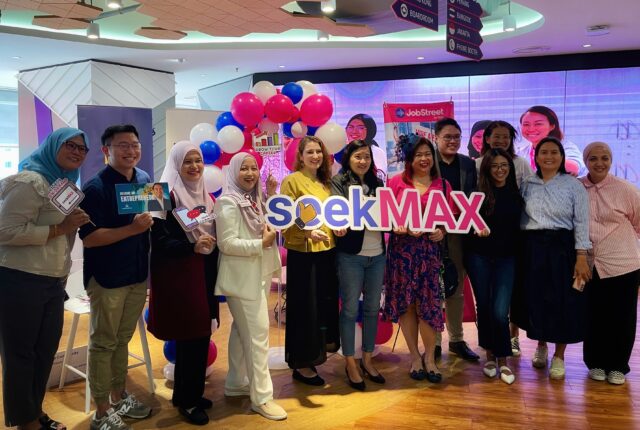SDG Academy Director and University College Dublin Professor Patrick Paul Walsh supervised Lorcán Hall’s final research project on ‘SDG 17: Partnerships for the Goals’ which examined how insurance multi-stakeholder partnerships across the public and private spheres might be better designed and delivered.
Senior, global private sector executives who had participated in insurance multi-stakeholder partnerships
recognized they have a relatively high-level understanding of sustainability, impacting their abilities to substantively engage with public sector organisations on partnership opportunities. Related to this discovery, they were concerned that their limited understanding of sustainability topics might lead them to mobilise and promote sustainability initiatives that won’t deliver meaningful results.
The following interview was conducted by Lorcan Hall and explores one private sector executive’s experience with integrating sustainable development and insurance.
Insurance and the Sustainable Development Goals: The Need for Transformational Innovations and Partnerships
By Lorcán Hall
Insurance – social protection programs and private insurance solutions – plays a critical role across the globe. It provides financial support when people, communities, and businesses experience unwanted events, helping to build their resilience.
In 2023, private insurance premiums will exceed USD 7 trillion with a significant portion of this paid out to beneficiaries. In addition, the insurance industry manages assets of more than USD 40 trillion. These massive figures illustrate the importance of the private insurance industry to the global economy, signaling that insurance has a key role to play in delivering the 17 Sustainable Development Goals.
In this interview, MSc. in Sustainable Development Graduate Lorcán Hall talks to Dr. Danilo Raponi, Group Head of Innovation at Generali. They discuss how one of the world’s largest insurance companies is contributing to the SDGs today and what it is doing to power the transformational innovations required to deliver the 2030 Agenda for Sustainable Development.
Lorcán: Hi Danilo, can we please start with a brief introduction to you and your role?
Danilo: With pleasure, Lorcán. My name is Danilo, and I am the Group Head of Innovation of Generali. I have held the role since January 2021, having joined the company from Munich Re. Leading innovation for a federated company such as Generali means taking charge to promote, steer, and nudge innovation projects across all the Business Units that make up the Group.
We have a few instruments that support our endeavours, of which the most impactful is our Innovation Fund: it works a little like a venture capital fund, albeit for internal initiatives, which means that the request for funding must come from one of our 70,000 colleagues. Having said that, most of the projects that come to the Fund are developed with external partners, confirming our thesis that the most impactful and sustainable innovations are born and developed as collaborative efforts.
Lorcán: What does sustainability mean to you and what role does innovation play?
Danilo: Sustainability, within the context of our operations at Generali, transcends the typically narrow focus on environmental topics. While our changing climate casts a long shadow, sustainability, for us, is a multi-faceted commitment with this promise explicitly woven into the fabric of our corporate strategy. The Sustainable Development Goals provide us with a tapestry of objectives to work towards across its pillars of economic prosperity, social inclusion, and environmental sustainability.
Insurance is not immune to the tectonic shifts across our global society. Our customers are our mirrors, reflecting the changing attitudes towards corporate responsibility. They are more than policyholders; they are individuals making statements, choosing brands that echo their ethical and social sensibilities. They recognise the growing risks to their health, homes, societies in which they live, and to our collective planet. They view insurance as a protector, offering peace of mind.
Innovation, in this scenario, becomes our compass and tool for the transformational changes demanded by the SDGs. Innovation is not only concerned with the incremental enhancement of existing processes. It is about pioneering new paths, about daring to overhaul systems and norms to generate transformational innovations that can protect under-served communities. The SDGs are a call to innovate, to engineer solutions that serve a higher purpose. At Generali, our innovation strategy is powered with this belief. From reimagining energy usage to reinventing how we approach community building, from individual policies to global initiatives, our approach targets purpose-driven solutions.
In summary, sustainability is not just a department within Generali; it is the lens through which we assess our existence, our goals, and our relationship with the world. It’s a commitment that demands we innovate responsibly, ensuring that the future is not just a place we’re travelling towards, but a destination we’ve helped craft.
Lorcán: A very inspiring perspective. Let’s discuss Generali’s journey towards this vision. I know that you have been working on an insurance solution for migrant and refugee populations. Can share more information about this project?
Danilo: Obviously, migration is a significant societal challenge. The war in Ukraine has created millions of unexpected refugees on top of the growing movement of migrants and refugees from developing nations to wealthier regions. We know that some of these people are climate refugees that have had their lives and livelihoods destroyed by climate-related events. It’s been estimated that climate change might cause over one billion people to migrate in the coming decades, a staggering number, meaning that much more work is required here. Generali is supporting migrants in several ways.
Our philanthropic arm, The Human Safety Net (THSN), has been supporting migrant groups in 23 countries for the past six years across several SDGs. Generali and THSN are now working together to support migrants integrate into their new environments. For example, we are developing financial solutions for migrants with the input of NGOs and humanitarian agencies. As part of this work, we are working on the establishment of a new company named Migrasure which intends to offer rental deposit insurance to migrants in Germany. In some European countries, renters are expected to pay a rental deposit of up to three months’ rent, a substantial requirement for people with limited financial resources. Workshops with these NGOs and humanitarian agencies identified rental deposits as significant financial barriers that insurance can help with, so this is where Migrasure will start.
It’s important to emphasise that the social ethos powering Migrasure should not suggest that the venture does not have a commercial mandate. Migrasure is receiving catalytic philanthropic and venture capital funding, but the business model must be financially sustainable. Doing good must also be good business as we know that philanthropic funding alone is unsustainable.
Lorcán: You mentioned climate refugees. We don’t need to labour the climate emergency, as it’s clear that urgent action is required to mitigate climate and support people to adapt to its effects, but what are you doing to power transformational innovations in this space?
Danilo: As you’ve said, we need many more transformational innovations as the incremental innovations that have brought us to where we stand today have clearly fallen short of what’s required. Climate mitigation efforts, reducing greenhouse gas emissions, and enabling the transition from fossil fuels to clean energy have correctly received a lot of attention, but adaptation efforts have not attracted the same support. SDG 13 – Climate Action and Target 13.1 calls for the need to strengthen resilience and adaptive capacity to climate-related hazards and natural disasters.
An example of how we’re sparking transformational innovations is our partnership with the United Nations Development Programme. This collaboration has many moving parts, including a new Insurance Innovation Challenge in Malaysia. We are seeking innovative insurance ideas for underserved populations, specifically those targeting communities vulnerable to climate risks. The winning solutions will have already been proven at a small scale but require support to scale their impact. A key criterion in the assessment process is that the solution must be explicitly linked to the SDGs. This is one example of how we are supporting climate-related insurance innovations to scale.
Lorcán: Changing topics now. The digital revolution has been identified as one of six critical transformations to deliver the SDGs. How are you employing data and digital technologies to create commercial and societal value?
Danilo: A couple of examples spring to mind. First, our Vitality solution in continental Europe leverages data and digital technologies to support our customers to live healthier lives and rewards them for this. This is SDG 3: Good Health and Well-being in action, specifically initiatives to reduce non-communicable diseases per Target 3.4. The Vitality programme uses behavioural science to support customers to introduce and sustain healthy behavioural changes. Customers who make healthy choices receive discounts on their insurance premiums while we benefit from having healthier customers who make fewer claims. So, this benefits Generali, our customers, and by extension it also reduces the strain on publicly funded healthcare systems.
Another point to highlight about Vitality is that it involves a private-private partnership between Generali and a South African insurance company named Discovery Life. Discovery Life has pioneered the use of behavioural science with its Vitality innovation and exported this across the globe. In general, there’s a myth that innovations born in the Global South are somehow unsuitable for the developed world, but Vitality demonstrates otherwise. And we hope that the solutions we support in the Malaysian innovation challenge I mentioned a moment ago can be scaled across developed and developing nations.
The second example is Domlife in France, provided by Europ Assistance, a Generali company. Domlife is a digital solution for older populations, disabled people, and people with chronic illnesses that have been arguably underserved by the digital revolution. It is available to these vulnerable groups, their family members, caregivers, health professionals, and social workers. An easy way to describe Domlife is that it’s a one-stop-shop for a vulnerable person and their circle of trust support system. It contains a calendar, facilitates messaging, sends notification, offers remote assistance, stores secure information, and other related services. The Domlife solution plugs into SDG 3: Good Health and Well-being and SDG 10: Reduced Inequalities and is a strong example of how digital solutions can support vulnerable populations. We are confident that Domlife will make a difference.
Lorcán: As we’ve touched on digital technologies, we should speak about the potential and promise of Generative AI. Do you believe that deploying this technology in the insurance sector can generate meaningful impact?
Danilo: The simple answer to this question is Yes. We believe that GenAI will be a transformational technology in the same way that the internet and smartphones have triggered many innovations. Let’s consider this a little more: from a supply-side perspective, we know that technology reduce the costs of production, making products and services more affordable to wider populations. This should enable more people to access insurance; however, financial literacy is a barrier, touching on SDG 4: Quality Education with Target 4.6 referencing literacy. Positively, GenAI can address this demand- side factor by educating people about insurance, helping them purchase it online, and acting as the first port of call when customers have queries or need to submit claims.
GenAI might also help insurers to personalise their products and services for low-income and vulnerable populations, noting that most insurance products have been developed with high- and middle-income populations in mind. This would enable financial inclusion, benefitting many SDGs, including SDG 10 ambitions to reduce inequality within and among countries. However, it’s important to highlight that GenAI, like all digital technologies, will not benefit everyone until the digital divide is addressed. There are still 2.6 billion people without access to the internet, so GenAI progress will fuel greater inequities and inequalities until everyone has access to the internet, digital devices, and digital literacy skills.
Lorcán: Partnerships have been a recurring topic throughout our discussion. As we know, SDG 17 aims to mobilise multi-stakeholder partnerships to drive transformational innovations, but partnerships are difficult. What are the secrets to successful collaborations?
Danilo: We should start by defining partnerships as it means different things to different people, sometimes causing confusion. Partnership is often used to describe commercial relationships whereby one organisation supplies products or services to another in return for some type of payment. These relationships are quite transactional and don’t generally create anything new. However, transformational partnerships are when two or more organisations pool their complementary resources to co-create new types of value. These partners don’t expect a payment in return for their contributions, and these collaborations are required for generating transformational innovations. From our partnership experience, the likelihood of success increases substantially when these factors exist:
Shared purpose, vision, and objectives. This might be obvious, but many collaborations are mobilised without these attributes, frequently leading them to fail. At times, objectives are simply misunderstood or hidden. I have seen this issue arise when organisations use the same partnership language, but one company only wants to sell its services to the other party, illustrating the need to clearly define what a partnership means to each organisation.
Societal and commercial objectives. Partnering organisations must also have a shared understanding of their respective objectives, and how the partnership value will be distributed. For example, one partner might be seeking commercial gain from the partnership’s innovation while the other is targeting societal value. These objectives are not mutually exclusive, but they have the potential to cause issues if they are not understood from the beginning. A commercial return is critical, however, as it provides the money to make the innovation self- sustaining.
Senior executive commitment. This is critical to mobilise resources and provide support when the inevitable challenges arise. Transformational partnerships take time to produce results. Indeed, some initial experiments might be unsuccessful, generating calls for the partnership to be shut down. But these pilots are designed with a scarcity of data and evidence, so it’s natural that some innovations won’t work. Senior executives help navigate these challenges.
One common theme across these factors is the need for transparency and openness. This begins with the initial exploratory engagements to the design work to hopefully scaling the innovation. As I’ve mentioned, transformational partnerships are long-term in nature and will experience challenges. High-trust relationships across the partnering organisations creates an environment where everyone feels like they are part of a joined up, impactful team.
Lorcán: We’re nearing the end of our discussion. What are your top three calls to action for the audiences who will read this interview?
Danilo: First, partner with organisations across the public and private sectors. The scale of our societal challenges cannot be solved by one organisation alone or indeed one part of society. A whole-of-society approach is required, meaning that we must seek opportunities to team up with like- minded organisations if we are serious about tackling societal challenges and risks. These partnerships must be approached without hidden agendas plus it’s critical to remain open-minded and humble.
Second, it’s key to pilot concepts rather than heavily invest into dissecting problems and producing detailed business cases. This innovation mindset is often referred to as “fail fast”, but it is better described as “learn fast.” Low cost and low risk experiments are required to test hypotheses, collect feedback, integrate these learnings, and refine concepts further. Of course, not every experiment will be successful but there are always lessons that can inform future innovation efforts. And we should share these learnings and knowledge widely to strengthen our collective intelligence.
Finally, act now. Some societal problems are so big and complex that they can be paralysing. Will our actions even make a difference? Where should we start? How do we start? It is common to feel that individual actions are insignificant, but one phrase regularly informs my thinking when these barriers arise: “Big enough to make a difference, small enough to get done.” So, breaking these large challenges into more manageable targets create momentum and confidence to power our abilities to scale solutions that will deliver tangible results.
Lorcán: Many thanks for sharing your valuable insights. I’m sure it will motivate people to explore the link between insurance and the SDGs and inspire them to mobilise transformational innovations. What’s the best way for people to follow your work?
Danilo: Absolutely, it’s been my pleasure. For those keen on following our sustainable journey, I’d suggest keeping an eye on Generali’s Sustainability webpage as we’re just getting started! Additionally, if you have collaboration ideas, please feel reach out to your nearest Generali office – we’re open to dialogue and discovery!
Explore the SDGs, Upskill, Reskill, and Obtain Professional Qualifications
There are a variety of innovative knowledge opportunities available to those of you who want to learn more about the 17 Sustainable Development Goals, the science underpinning their 169 targets, and the intersection of science, policy, and practice. Notably, insurance – social protection programmes and private insurance solutions – feature as solutions in many of these courses:
- Online Certificates: The SDG Academy offers over 40 online courses from global academics, policymakers, and practitioners.
- Professional Certificate: The SDG Academy offers an online Professional Certificate in the Foundations of Sustainable Development.
- Professional Diploma: University College Dublin in partnership with The SDG Academy offers an online Professional Diploma in the Foundations of Sustainable Development. The Professional Certificate above counts towards this.
- Master’s of Science: University College Dublin in partnership with The SDG Academy offers an online MSc. in Sustainable Development. The Professional Diploma above counts towards this.
- LinkedIn Learning: The SDG Academy has teamed up with LinkedIn Learning to make micro-courses available on its platform.

Lorcán Hall studied for an MSc. in Sustainable Development at University College Dublin in partnership with UN Sustainable Development Solutions Network. He is an MBA-educated strategy and innovation insurance professional with over 20 years’ experience working with leading companies in Ireland, Germany, Switzerland, and the UK.





